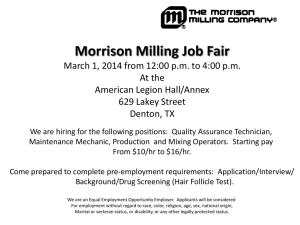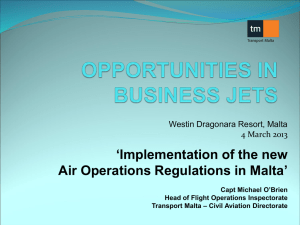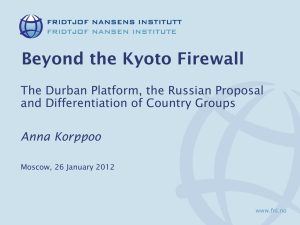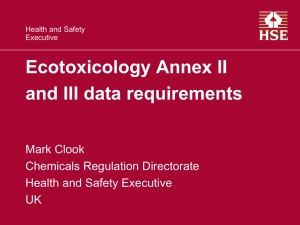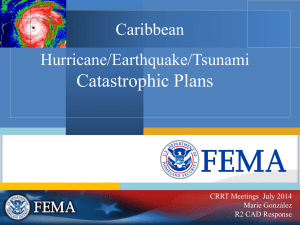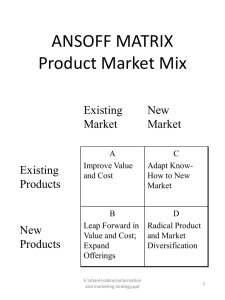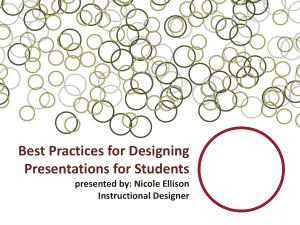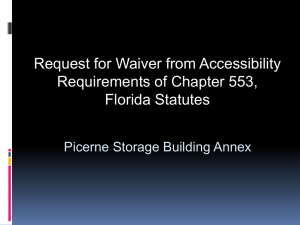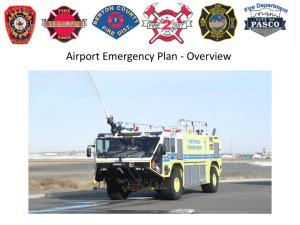Sustainable development - an educational package for the schools
advertisement
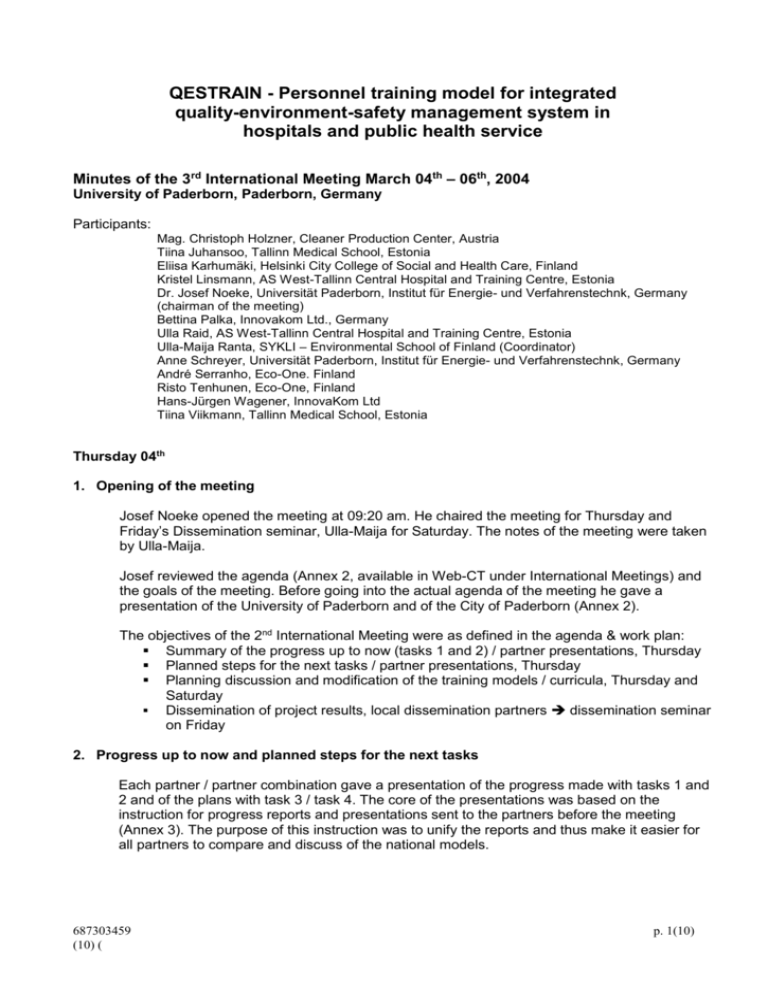
QESTRAIN - Personnel training model for integrated quality-environment-safety management system in hospitals and public health service Minutes of the 3rd International Meeting March 04th – 06th, 2004 University of Paderborn, Paderborn, Germany Participants: Mag. Christoph Holzner, Cleaner Production Center, Austria Tiina Juhansoo, Tallinn Medical School, Estonia Eliisa Karhumäki, Helsinki City College of Social and Health Care, Finland Kristel Linsmann, AS West-Tallinn Central Hospital and Training Centre, Estonia Dr. Josef Noeke, Universität Paderborn, Institut für Energie- und Verfahrenstechnk, Germany (chairman of the meeting) Bettina Palka, Innovakom Ltd., Germany Ulla Raid, AS West-Tallinn Central Hospital and Training Centre, Estonia Ulla-Maija Ranta, SYKLI – Environmental School of Finland (Coordinator) Anne Schreyer, Universität Paderborn, Institut für Energie- und Verfahrenstechnk, Germany André Serranho, Eco-One. Finland Risto Tenhunen, Eco-One, Finland Hans-Jürgen Wagener, InnovaKom Ltd Tiina Viikmann, Tallinn Medical School, Estonia Thursday 04th 1. Opening of the meeting Josef Noeke opened the meeting at 09:20 am. He chaired the meeting for Thursday and Friday’s Dissemination seminar, Ulla-Maija for Saturday. The notes of the meeting were taken by Ulla-Maija. Josef reviewed the agenda (Annex 2, available in Web-CT under International Meetings) and the goals of the meeting. Before going into the actual agenda of the meeting he gave a presentation of the University of Paderborn and of the City of Paderborn (Annex 2). The objectives of the 2nd International Meeting were as defined in the agenda & work plan: Summary of the progress up to now (tasks 1 and 2) / partner presentations, Thursday Planned steps for the next tasks / partner presentations, Thursday Planning discussion and modification of the training models / curricula, Thursday and Saturday Dissemination of project results, local dissemination partners dissemination seminar on Friday 2. Progress up to now and planned steps for the next tasks Each partner / partner combination gave a presentation of the progress made with tasks 1 and 2 and of the plans with task 3 / task 4. The core of the presentations was based on the instruction for progress reports and presentations sent to the partners before the meeting (Annex 3). The purpose of this instruction was to unify the reports and thus make it easier for all partners to compare and discuss of the national models. 687303459 (10) ( p. 1(10) For Task 2 – Development of the training model / curricula the objectives and partners´ roles were, as defined in the work plan: Task 2.1 - Objectives: Outline of the pedagogic and substance aspects of the personnel training model for quality, environmental and safety issues Additional vocational training (at work place) Task 2.1 – Partners´ roles Development of the training model Task to be divided into subtasks between the partners; the outcomes of the subtasks to be gathered together as the training model The extent and the coverage of the model to be decided between the partners based on the results of the evaluation and available resources allocated for the task CPC, Innovakom + University of Paderborn, SYKLI + Eco-One, West-Tallinn Central Hospital and Training Centre Task 2.2 – Objectives Outline of the pedagogic and substance aspects of the personnel training model for quality, environmental and safety issues Basic vocational training of nurses / practical nurses Task 2.2 – Partners roles Basic vocational training of nurses / practical nurses The task to be divided between Tallinn Medical School and Helsinki City College of Social and Health Care so that each works on a specific part of curriculum As was discussed and agreed at the previous meeting in Graz for Task 2.1 the partners worked out their national models (as the sub-tasks) since it was at that phase still too early to clearly define the general model. A rough general model / features of the model was anyhow figured out, see the minutes of the 2nd meeting. For Task 3 – Testing of the training model in pilot hospitals and for Task 4 – Testing the integration of quality-environment-safety issues to the vocational curricula of nurses / practical nurses the objectives and partners´ roles are as defined in the work plan: Task 3 – Objectives: Testing of the applicability of the training model in pilot hospitals with pilot training events targeted at different personnel groups Gathering feedback from the personnel of the pilot hospital Task 3 - Partner’s roles: Implementation of the pilot training at pilot hospitals The partners and 5 pilot hospitals/health centre in different countries will implement testing so that only certain part of the training model or a training period for a certain personnel group will be tested in one pilot hospital CPC and Unfallkrankenhaus AUVA, Innovakom + University of Paderborn and St. Johannisstift Paderborn, SYKLI + Eco-One and Lohja Health Centre + Lohja Hospital Area, West-Tallinn Central Hospital and it’s Training Centre Task 4 – Objectives: Implementation of a pilot course Feedback and suggestions for improvement Task 4 – Partner’s roles: Tallinn Medical School and Helsinki City College of Social and Health Care will test the integration as a part of their existing courses 2.1. University of Paderborn, Innovakom Ltd and St Johannisstift Paderborn Bettina presented the progress and steps made by German partners with tasks 1 and 2. Josef continued with the requirements of the training model and Anna finished the presentation with the overview to the practical application of the model, task 3. German presentation and report are included as Annex 4 and 5, respectively, and are available at WEB-CT as files Vortrag Meeting.pdf and QESTRAIN - Second Progress Report - Germany.pdf 687303459 (10) ( p. 2(10) 2.2. CPC Austria and Unfallkrankenhaus AUVA (UKH) Christoph presented the progress and steps made with tasks 1 and 2 and the plans for pilot training, task 3. The Austrian national model is presently concentrated in environmental issues. Safety issues are later added to the contents of the model, and after that, the quality issues. Austrian presentation and report are available as Annexes 6 and 7, respectively and are available at WEB-CT as files pre-tasks2.ppt and 2nd IR CPC.pdf 2.3. SYKLI – Environmental School of Finland, Eco-One, Lohja Hospital Area and Lohja Health Centre Ulla-Maija and Risto presented the progress and steps made with tasks 1 and 2 and plans for the pilot trainings, task 3. Part of the pilots has been done already, during the autumn. Finnish presentation and report are included as Annexes 8 and 9, respectively and are available at WEB-CT as files Report slides Sykli E-O 3S.pdf and Report 2 Sykli E-O 3S.pdf 2.4. West-Tallinn Central Hospital and the Training Centre Ulla and Kristel presented the progress and steps made with tasks 1 and 2 and plans for the pilot trainings, task 3. The presentation is included as Annex 10 and available at WEB-CT as file WTCHpresentation.ppt 2.5. Tallinn Medical School Tiinas presented the progress and steps made with tasks 1 and 2 and plans for the pilot trainings, task 4. The presentation is included as Annex 11. 2.6. Helsinki City College of Social and Health Care (HESOTE) Eliisa participated for the first time during the project at Qestrain international meeting and presented herself. Hesote has cooperated with Tallinn Medical School with Tasks 1, 2 and plans for 4 and thus Eliisa presented the common summary of progress and plans. Hesote´s presentation material is included as Annex 12 and available at WEB-CT as files KOK SAKSA TASKS.ppt, KOK SAKSA DEVELOPMENT.ppt, KOK SAKSA PILOT.ppt, sateenvarjo keke2.ppt, sateenvarjo LAATU.ppt, sateenvarjo turva.ppt, sateenvarjo yht.ppt and KOK SAKSA DISSEMINATION.ppt 2.7. Summary of the results Task 2.1 - Even though each partner / country had worked with developing the national models it appeared that the basic approach in all is surprisingly similar. The national models support each other. Partners can utilize the contents of other national models in their own models. The contents and formulation of the common model was discussed and the basic features agreed, this discussion was continued on Saturday. Task 2.2 - Hesote and Tallinn Medical School had worked together with the curricula model; the common model is described as “umbrella” approach as presented in Hesote´s material (files sateenvarjo keke2.ppt for environmental issues, sateenvarjo LAATU.ppt for quality issues, sateenvarjo turva.ppt for safety issues, sateenvarjo yht.ppt for all three QES issues; sateenvarjo = umbrella). In the pilots – Task 4 – Hesote will concentrate on QES issues concerning hospital work and Tallinn Medical School on the care of out patients. Friday 05th 687303459 (10) ( p. 3(10) 3. Dissemination Seminar German partners InnovaKom Ltd and University of Paderborn organized the dissemination seminar. The seminar was held at the Educational Centre of the pilot hospital St Johanisstift. Hans-Jürgen Wagener and Josef Noeke were chairing the seminar. The language of the dissemination seminar was German since the participants were from local and regional hospitals and health care organizations. The agenda and corresponding presentation materials were as follows: Opening and greetings, Sven Freytag, St. Johannisstift Paderborn Presentation of the project, Hans-Jürgen Wagener, Annex 13, available in WEB-CT as file Dissemination_Seminar_Presentation_QESTRAIN.pdf Presentation of the German project, Josef Noeke, Annex 14, available in WEB-CT as file Dissemination_Seminar_German_Procedure_and_Results.pdf Presentation of the Finnish projects, Tasks 2.1 and 2.2, Annex 15, Risto Tenhunen, available in WEB-CT as file presantation tagung.ppt Presentation of the Austrian project, Christoph Holzner, Annex 16, available in WEBCT as file pre-dissemination_dt.ppt Presentation of the Estonian projects, Tasks 2.1 and 2.2, Tiina Juhansoo, Annex 17 (Present Diss Estonia.pdf), Presentation of the North-Westphalian working group for environmental protection in hospitals, Gerd Schäfer, Environmental protection officer of the hospital Bergmannsheil, Bochum, Annex 18, available in WEB-CT as file Dissemination_Presentation_AK_Umwelt.pdf Presentation of the pedagogical aspects of environmental education for adults, Dr. Christa Henze, Institute for Environmental Education, University of Duisburg, Annex 19, available in WEB-CT as file Dissemination_Seminar_Pedagogical_aspects_of_environmental_education_for_adults .pdf Presentation of the educational centre of the St Johannisstift Paderborn, Jurgen Grossr and Barbara Matina, Annex 20, available in WEB-CT as file Dissemination_Seminar_Presentation_Educational_Center.pdf Presentation of the electronic management handbook quality, environment, safety in the hospital: concrete structure and practical experiences, Bettina Palka, Anne Schreyer and Hans-Jurgen Wagener, Annex 21, available in WEB-CT as file Dissemination_Seminar_Electronical_Handbook.pdf Final discussion 3.1. Visit at the educational centre and the hospital After the dissemination seminar the project partners visited the educational centre and the maternity department of the pilot hospital guided by Ms Barbara Matina Saturday 6th 4. Planning for the tasks 3 and 4 and planning for the general models and for the final products The partners had already presented their plans for the their pilots, tasks 3 and 4. As to task 3, the pilot trainings support the development of the national models on the basis of which the general model (product 1) is put together. Ulla-Maija presented the idea and approach for the general models; see Annex 22 (Qestrain Modell). This had been drafted on the basis of the previous meeting and of the partner’s reports. The planning was started by working out the ideas and structure for the general models in three groups: 687303459 (10) ( p. 4(10) Group 1 - Personnel training model for hospitals, Innovakom, University of Paderborn, CPC Austria and Eco-One (Product 1) Group 2 - Personnel training model for hospitals, West-Tallinn central Hospital, Sykli (Product 1) Group 3 – QES aspects in Curriculum of nurses and practical nurses, Tallinn Medical School, Hesote (Product 2) The groups presented their results. The results of the groups 1 and 2 are shown below, the group 3 discussed further about details of the “umbrella” model. 687303459 (10) ( p. 5(10) Group 1 - Qestraining in Health System, presented by Bettina 1) Basic vocational training The basic training of the personnel working at the hospital 2) Further training ( personnel training model) a) Identifying the needs (1) Personnel –oriented - questionnaire example, questionnaire - interviews example, experiences - data collection - etc.. (2) Process –oriented - questionnaire - interviews - process analysis tool: MetaPlan - Inspection example / experiences - etc… b) Satisfying the needs needs overview; e.g. Q E - quality motivation - hazardous material -… -… methods S - ergonomics -… …strengths / weaknesses example for the contents 687303459 (10) ( p. 6(10) Group 2 – Two approaches, presented by Ulla-Maija - inductive - deductive Inductive Deductive Didactics: brainstorming e-Learning background description of processes goals & needs workshops seminars studies questionnaires IC guidelines occupational health work safety legislation training plan to make a good basement general approach PERSONNEL & MANAGEMENT individual approach to make an individual commitment qualification matrix in X department Using the German tool qualification matrix in Y department qualification matrix in Z department Didactics: - Developmental discussions - Individual discussions - 687303459 (10) ( .. p. 7(10) 5. Planning for the final product The contents of the final products were discussed. It was suggested to have one physical product (printed and CD/www-based), which describes: - the project and the two project lines and products (summary) - final products 1 and 2, general versions (in detail) The contents could include the following: Qestrain health care Summary of the both educational systems (two parts): basic vocational education (nurses, practical nurses; other ?) further education / personnel training Official curricula of nurses / practical nurses Description of the different ways for the implementation of further training - different personnel groups - … description of tools - tool for writing the needs - analysing tool - …. - MetaPlan tool for analysing the training afterwards Description of the cases Final products - Overview of product 1 o Description of the several ways o Description of the different tools o Description of how to use the different tools o ... - Final conclusion o What has been done in the project product o What are the results - Overview of product 2 o Comments for the proposition / approach for the integration of QES issues in the curriculum o …. 6. Evaluation of the meeting The evaluation of the meeting was carried out using the Meta-Plan technique. Before the evaluation Bettina and Hans-Jurgen gave an introductory presentation of the technique and it’s use, Annex 23 (Presentation MetaPlan). The issue asked to consider individually was which aspects of the meeting were good (written on green papers) / bad (written on red papers): Structure of the contents of the meeting Organization and basic conditions of the meeting and around the meeting Utility of the meeting Dissemination seminar 687303459 (10) ( p. 8(10) The green and red papers were collected, read and pinned onto the table by Bettina and Anne. The results of the evaluation are shown in Annex 24, available in WEB-CT as file Strengths and weaknesses.pdf. 7. Other issues The next meeting was agreed to be on 09. – 11.09.2004 (Thursday - Saturday) in Tallinn. West-Tallinn Central Hospital is responsible for organizing the meeting at Tallinn, Estonia. The objectives of the 4th meeting are, as defined in the work plan: Discussion and modification of the training model Dissemination of project results / seminar and work shop / local dissemination partners 8. Closure of the meeting The meeting was closed on Saturday 6th of March at 12:30 pm. The programme, however, continued after lunch with the guided tour in the city centre of Paderborn Annexes – filed in Qestrain project WEB-CT: Annex 1 Annex 2 Annex 3 Annex 4 Annex 5 Annex 6 Annex 7 Annex 8 Annex 9 Annex 10 Annex 11 Annex 12 Annex 13 Annex 14 Annex 15 Annex 16 Annex 17 Annex 18 Annex 19 Annex 20 Annex 21 Annex 22 Annex 23 Annex 24 Agenda of the 3rd international meeting in Paderborn Opening of the meeting, 0 Start.pdf Instructions for the presentations, Redline.ppt German presentation, Vortrag Meeting.pdf German report, QESTRAIN – Second Progress Report – Germany.pdf Austrian presentation, pre-tasks2.ppt Austrian report, 2nd IR CPC.pdf Sykli&Eco-One´s presentation, Report slides Sykli E-O 3S.pdf Sykli&Eco-One´s report, Report 2 Sykli E-O 3S.pdf West-Tallinn Central Hospital´s presentation, WTCHpresentation.ppt Tallinn Medical School’s presentation, 4 Presentation Estonia Medschool.pdf Hesote´s presentation, files: KOK SAKSA TASKS.ppt, KOK SAKSA DEVELOPMENT.ppt, KOK SAKSA PILOT.ppt, sateenvarjo keke2.ppt, sateenvarjo LAATU.ppt, sateenvarjo turva.ppt, sateenvarjo yht.ppt and KOK SAKSA DISSEMINATION.ppt Dissemination_Seminar_Presentation_QESTRAIN.pdf Dissemination_Seminar_German_Procedure_and_Results.pdf Presentation of the Finnish projects, presentation tagung.ppt Presentation of the Austrian project, pre-dissemination_dt.ppt Presentation of the Estonian projects, 5 Present Diss Estonia.pdf Presentation of the North-Westphalian working group for environmental protection in hospitals, Dissemination_Presentation_AK_Umwelt.pdf Dissemination_Seminar_Pedagogical_aspects_of_environmental_ education for_adults.pdf Dissemination_Seminar_Presentation_Educational_Center.pdf Dissemination_Seminar_Electronical_Handbook.pdf Presentation for the idea of the general models, 1 Qestrain Modell.ppt Presentation of the MetaPlan technique, 2 Presentation MetaPlan Results of the evaluation, Strengths and weaknesses.pdf. Josef Noeke 1st Chair of the meeting 687303459 (10) ( Ulla-Maija Ranta Secretary and 2nd Chair of the meeting p. 9(10) 687303459 (10) ( p. 10(10)
